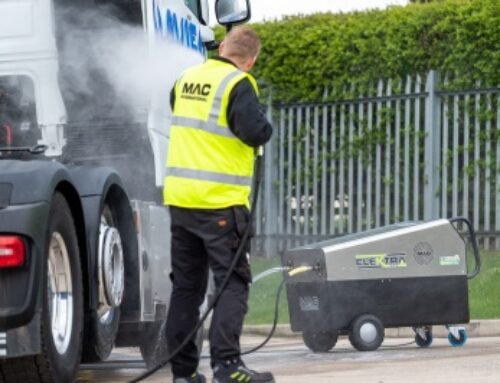Transport training in the age of coronavirus
 Derek Broomfield, chairman of transport training provider Novadata, charts the recent shift to online learning – and back again
Derek Broomfield, chairman of transport training provider Novadata, charts the recent shift to online learning – and back again
As news of a lockdown broke, the industry as a whole adapted rapidly to this unprecedented scenario, to deliver a range of Driver CPC, operator licence awareness training (OLAT) and transport manager refresher training online.
This reflected the way in which the industry as a whole responded to the coronavirus threat, with wholehearted commitment to carrying on with professionalism against unprecedented odds. As the benefits of a successful application of training online became clear, we were able to observe both advantages and disadvantages to online training.
The most obvious advantage is the ability to train from home regardless of distance, so that we could offer training to candidates from across the UK; and even drivers who found themselves locked down overseas had the opportunity to attend courses if they wished to make good use of their downtime.
We undoubtedly created a far smaller carbon footprint by holding training online, and many learned new skills in video conferencing, which will stand them in good stead in a wide range of circumstances in future.
Online training has proved very flexible in terms of being able to share information, and so we have been able to help Transport Manager CPC holders refresh their knowledge and to make restricted O-licence holders more aware of best practice, safeguarding their all-important O-licences.
For one of our first online Transport Manager CPC refresher courses, we were joined by a UK traffic commissioner, observing the course in action and giving it the thumbs up. We have also been able to deliver quite a few different Driver CPC courses.
 The ability to share a screen has meant that we could continue to use the same materials in terms of presentations and videos that we would in person. We have also been able to answer questions and debate issues in real time, ensuring that periodic Driver CPC has delivered a great deal of practical, applicable knowledge, as well as fulfilling the 35 hours legal requirement.
The ability to share a screen has meant that we could continue to use the same materials in terms of presentations and videos that we would in person. We have also been able to answer questions and debate issues in real time, ensuring that periodic Driver CPC has delivered a great deal of practical, applicable knowledge, as well as fulfilling the 35 hours legal requirement.
The facility to train online has been very timely, as the industry as a whole has been under enormous pressure from the earliest days of the crisis.
Being able to train online while on furlough has been very useful for some drivers, and a small number of former drivers, who have found other employment disappearing in the face of the current crisis, have been able to return to driving professionally by completing their Driver CPC training online.
However, where we have suffered is in the more hands-on subjects, and for this reason, many of us are delighted to be able to return to the classroom.
Obviously, it was not possible to deliver first aid courses, manual handling courses, or any module that requires specialist equipment for drivers to practice on or to observe first hand. We particularly missed running first aid modules, as these provide the opportunity to gain a first aid qualification, which helps the driver’s organisation to fulfil its requirement for a first aider.
Returning to classroom-based training opens up the possibilities once again to tackle these more practical subjects. The return of ADR training, which was not sanctioned for online training during strict lockdown, is also particularly welcome, especially for those who urgently need to renew their qualification.
Undoubtedly, some drivers and managers simply did not take to the whole concept of online training. Not everyone is keen on Zoom or its many equivalents, and a great many have been eager to get back to training in a physical classroom, face to face with a trainer.
We are not exactly back to how things were before the crisis first struck, however, so we’re adapting once again, as an industry.
Classroom-based candidates will be kept safe by our use of social distancing measures. We will restrict numbers on courses to a dozen, initially, and, at Novadata at least, we will be adhering to the 2m distancing rule, even if Government advice has dropped to 1.5m or 1m distancing by the time of publication.
Obviously, cleaning and sanitising routines have been greatly stepped up in order to ensure the personal safety of all our candidates. For the time being we will avoid running multiple courses as much as possible, so that arrival and departure times are not overcrowded and queuing times are not excessive.
We face further challenges in restarting first aid training. Sharing even the simplest equipment will be a thing of the past. Equipment that was once shared and passed around must now be provided for each individual candidate. This will have cost implications. Some of our social distancing measures, such as marking out safe waiting zones, will be a one-off cost which we will absorb.
However, providing equipment in the form of a first aid training kit for each candidate will be an ongoing requirement for every course. This will be an additional cost, albeit a modest one, that we will, reluctantly, have to pass on. Given that passing the course will provide the candidate with a first aid qualification, this will still be well worthwhile.
In other subjects, specialist training equipment may now only be demonstrated by the trainer, and observed by the candidates, where once it might have been offered for anyone to try.
Fortunately, with a wider variety of courses on offer, there will be sufficient time between the different subjects for ‘hands-on’ equipment to be deep cleaned and quarantined between uses, safeguarding our trainers too.
There are definitely pluses for both scenarios, online and classroom-based. In terms of accessibility, life was made potentially much easier for those in managerial roles with disabilities. Our Manager CPC Refresher courses and OLAT training, for example, could be attended without leaving home.
How we move forward is still open to debate as we discover the new normal, but our feeling is that we haven’t seen the last of training online, and that the future may well hold more of a blend of the two, both virtual and face-to-face.











